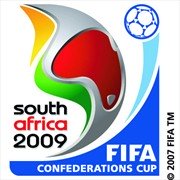
Today the Confederations Cup gets under way in South Africa, this relatively recent addition to the international schedule will go on for the next two weeks as it continues to establish itself as a credible competition. The basic premise is that the tournament is represented by the spectrum of international teams who are the reigning champions of the other international competitions under FIFA's mandate (the respective confederation championships).
You may be surprised but this does amount to seven nations, with South Africa filling the eighth spot as the host nation. For full clarity the seven title holders are as follows:
Italy- 2006 World Cup Winners
Spain- 2008 European Championship Winners
Brazil- 2007 Copa America Winners
Egypt- 2008 African Nation Winners
Iraq- 2007 AFC Asian Cup Winners
USA- 2007 CONCACAF Gold Cup Winners
New Zealand- 2008 OFC Nation Cup Winners.
The line up is quite formidable, and even though some of the nations involved may be regarded as cannon fodder for the traditional power houses, it cannot be argued that they haven't earned their place in South Africa by right or that they couldn't spring a surprise or two. The opening match of the tournament will take place between South Africa and Iraq at 3pm today, in the Ellis stadium in Johannesburg. This stadium, as with the other three being used throughout the next two weeks, is one that will be used in a year’s time for the 2010 World Cup.
The format has changed little since the Confederations Cup started out as the King Fahd Cup in 1992. Originally it comprised of just four title-holding nations and excluded the World Cup, European Championship and the OFC Nations Cup. This expanded in 1995 to include Denmark as winners of Euro '92, and Saudi Arabia as hosts- they had relinquished the Asian Cup to Japan in the 1992 final.
It was after this point that FIFA stepped in to assume control of the competition, and they
re-branded it as the Confederations Cup in time for 1997. It is since this time that the Confederations Cup settled into the eight nation format that it takes now. All that has notably changed in the intervening years is FIFA's decision to place another emphasis on the competition. Up until 2005 it had taken place every two years, but FIFA decided that from then on it should take place just every four years and that it should be hosted by the nation due to host the World Cup in the subsequent year.
This actually makes a lot of sense, something for which FIFA cannot be regularly credited for. Not only does it provide an opportunity for the would-be World Cup hosts to stage a proper dress rehearsal, it also gives the host nation a much needed taste of competitive international football. The host nation traditionally does not have to qualify for the World Cup, but then this does leave a void where they are less active in the rough and tumble of meaningful fixtures- a crucial aspect of being prepared for the biggest international tournament in the World.
The history of the Confederations Cup is unsurprisingly intertwined with Brazil. They are after all regular winners of international competitions, and they have been a constant participant since 1997, winning it twice and losing another final- they are the current holders. They aren't the holders of the best tournament record though, because they are always involved their percentage success rate pales in comparison with Denmark and France. Both of these European nations have won the tournament each time they have been entered. A Michael Laudrup inspired Denmark beat Argentina in 1995, and France cleaned house in 2001 and 2003.
With regards to what 2009 will have to offer, the expectancy will be that either Spain or Brazil will come good. Spain emphatically threw off their tag as perennial under-achievers at Euro 2008 and are expected to be strong favourites for next summers World Cup. They also have the easier looking group in South Africa, their opponents will be the hosts, Iraq and New Zealand.
Brazil meanwhile are beginning to come good again after a rocky start under the legendary former captain and current manager Dunga. They have lost just one of their fourteen World Cup qualifying matches so far, and after their unexpected triumph over Argentina in the 2007 Copa America, confidence is once again as high as the expectancy. Italy are also obviously a threat and not to be underestimated, especially now that their World Cup winning coach Marcello Lippi is back in charge after his sabbatical.
The smaller nations will have to be negotiated seriously and with respect though. Iraq secured a momentous victory in the 2007 AFC Asian Cup, defeating Australia and South Korea along the way before Saudi Arabia in the final. In the wake of the war and occupation of their country, Iraq's victory has to rank as one of the great sporting achievements of modern times. However they may fair in the Confederations Cup it will be a triumph, but the big teams will be wise to be wary of them as well as Egypt and New Zealand.
Either way the 2009 Confederations Cup should act as a welcome taster for the World Cup next year, not only will there be some good football on show it will show the World some of what can be expected in the summer of 2010. The Olympics may often be bandied around as being the greatest show on Earth, but we all know deep down that the World Cup will and always does trump it in every capacity, the countdown starts now...
